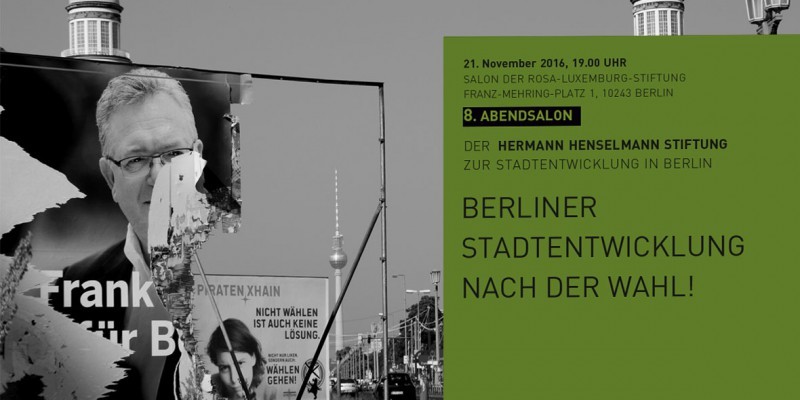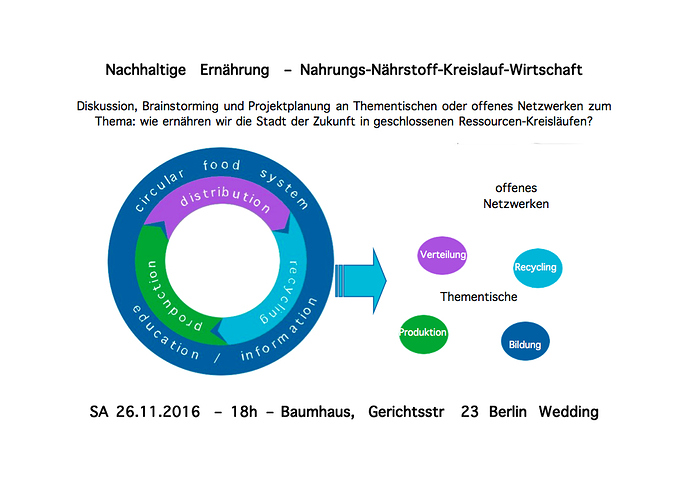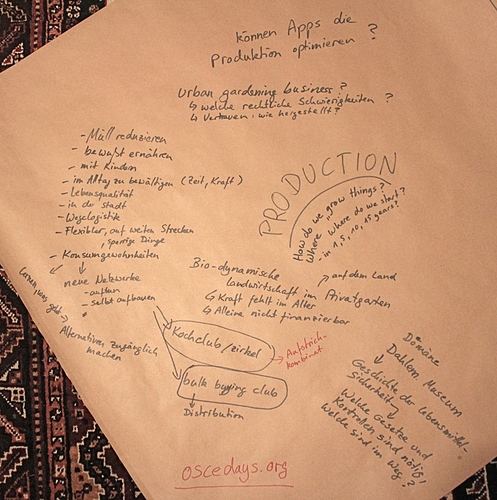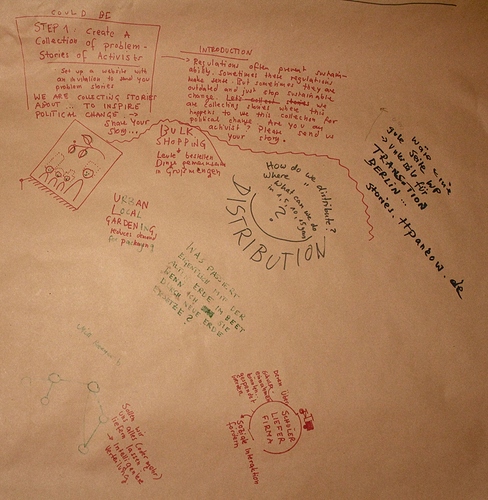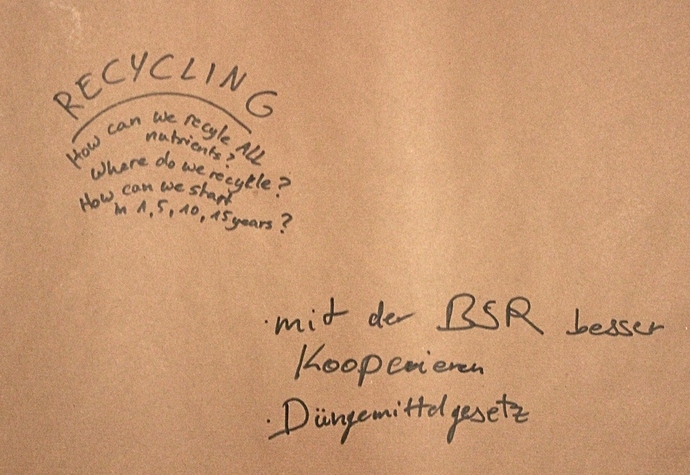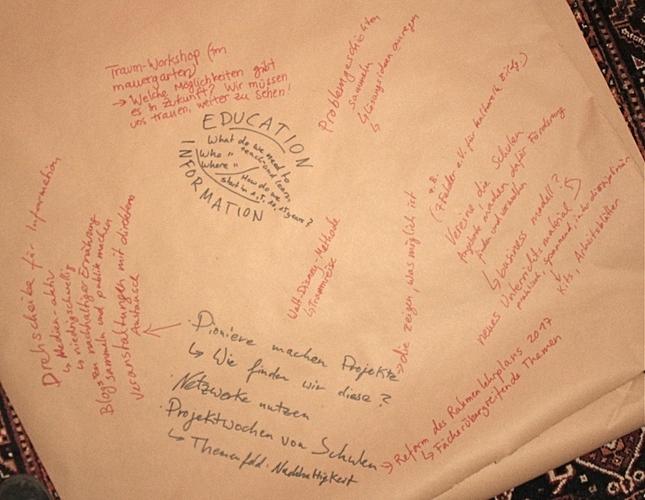Reactions to our invites:
http://berlin.imwandel.net/ want to do a feature on this @Lars2i , maybe you can get in touch with Luca, I gave him your mail
Comment from Eberswalde (close to Berlin in Brandenburg): bin etwas verwirrt von der Vision: Ist denn das Ziel, dass sich Berlin bis 2030 ernährungstechnisch selbst versorgt (so verstehe ich den ersten Satz)? Oder anders: macht es nicht Sinn weitestgehnde Selbstversorgung zusammen mit Brandenburg anzustreben? Bin etwas verunsichert von der Zielsetzung…
- I replied: ja, natürlich wäre Brandenburg Teil einer solchen Vision. Wenn das nicht klar wird, sollte es reingeschrieben werden. Für mich war das aus dem 50km Umkreis ersichtlich, aber du kannst es gern verbessern. Und ja, bis 2031 wäre das ein ambitioniertes Ziel, Berlin wieder regional zu versorgen, das sollte uns aber nicht davon abhalten, es so zu schreiben, oder?
Ingo has now contributed to the paper.
LaKuNaBi and Stadt macht satt and Baumhaus have already contributed to the text.
Comment via mail from Berlin-Wedding:
… Meine derzeitigen Ideen kreisen ja eher erstmal um Guerilla-Gärtner-Aktionen, weshalb sie vielleicht nicht so reinpassen in ein “offizielles” Strategiepapier, oder?
My reply:
… Es ist kein ‘offizielles’ sondern ein Transition-Strategiepapier, da ist erstmal alles erlaubt. Für mich stellt sich deshalb nur die Frage: Wie können Guerilla-Gärtner-Aktionen zur zukünftigen nachhaltigen Ernährung der Stadt Berlin in geschlossenen Nahrungs-Nährstoff-Kreisläufen beitragen. Dass sie aktuell nicht immer legal sind, spielt dabei keine Rolle. Dafür ist die 5. Spalte da: was müsste sich politisch ändern, damit dieser Beitrag zur Stadternährung überhaupt und in Zukunft besser und mehr stattfinden kann? …
Answer from VHW:
… Ihr kollaboratives Format ist spannend, ich habe gerade auch einmal in die verlinkten Dokumente geschaut. So wichtig das Thema Ernährung zweifellos ist, steht es doch nicht im Mittelpunkt der Forschungstätigkeiten des vhw. Deshalb können wir uns – schon allein aufgrund mangelnder Expertise – nicht so gut einbringen. Gleichwohl ist es auch für den Verband von großem Interesse, ob und wie gut Kollaborativformate wie das von Ihnen angestoßene funktionieren können…
My reply:
… gerade die großen Wohnungsbauunternehmen, wie sie im VHW zusammengeschlossen sind, können unserer Meinung nach einen wesentlichen Beitrag leisten, nicht nur als Teil einer urbanen Landwirtschaft mit ihren Möglichkeiten für neue Geschäftsfelder, sondern auch bei der Information und Bildung von Mietern und Gärtnern. Dies ist insbesondere in den Berliner Bezirken Pankow, Charlottenburg und Friedrichshain-Kreuzberg relevant, wo aktuell Vorschläge zur ‘Essbaren Stadt’ in den Bezirksämtern geprüft werden.
Für Ihre Teilnahme an unserem Projekt ist weniger eine Expertise im Bereich Ernährung gefragt als Ihre Erfahrung im Wohnungsbau und im Umgang mit den Mietern. Wenn in Ihrem Verband unser experimentelles Format nicht das passende ist, dann ist das für uns ein wichtiges Feedback. Ich würde gerne mit Ihnen darüber sprechen, in welcher anderen Form man evtl. besser ins Gespräch kommen könnte. Sie erreichen mich unter …
We are now invited to a VHW-networking event on the 2.12.2016
Mail from Umweltkalender:
… über Ihren Newsletter bin ich auf den Diskussionsabend „Gemeinsam für ein ‚Circular Food System‘ – Nahrung-Nährstoff-Kreislaufsystem in Berlin“ am 26.11. aufmerksam geworden. Da die Veranstaltung wunderbar in unseren Umweltkalender passt, habe ich sie als Redaktionstipp eingetragen: www.umweltkalender-berlin.de/angebote/details/49142. Ich hoffe, Sie sind mit der Darstellung einverstanden.
Der Umweltkalender Berlin ist ein Projekt der Stiftung Naturschutz Berlin. Die Online-Informationsplattform dient der Steigerung der Bekanntheit und Nachfrage des vielfältig verfügbaren Berliner Veranstaltungsprogramms im Bereich Natur und Umwelt.
Ich möchte Sie herzlich dazu einladen, künftige Veranstaltungen mit Umwelt-, Natur- oder Nachhaltigkeitsbezug selbst in unseren Umweltkalender einzutragen.
Unter folgenden Link können Sie sich kostenlos als Anbieter registrieren:
www.umweltkalender-berlin.de/anbieterbereich
